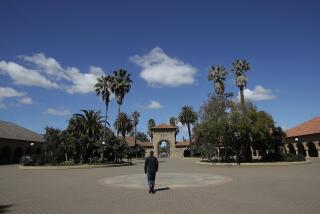A Welcome Affirmation
The U.S. Supreme Court’s message in Monday’s affirmative-action rulings is clear and welcome: This nation’s future depends on leaders trained by their exposure to “the ideas and mores of students as diverse as this nation.”
The late Justice Lewis F. Powell Jr. wrote those words. In a 1978 opinion for a divided court, he declared unconstitutional admissions programs based on numeric quotas, such as the one then used by UC Davis’ medical school. But Powell also argued that since states had a compelling interest in diversity, race could be one factor among many in deciding who got a seat in the classroom.
Twenty-five years later, a new, more conservative majority still agrees with him. In two cases involving the University of Michigan, the court held that public universities may give African American, Latino and Native American applicants an edge but again struck down rigid schemes. Monday’s twin decisions allow universities to use race in admissions. States still may ban the practice, as California unwisely has done.
Michigan’s undergraduate admissions process automatically awarded 20 points to every applicant in an “underrepresented” minority. Writing for the 6-3 majority, Chief Justice William H. Rehnquist said the system violated the Constitution’s equal protection clause. Given the rigid, impersonal and across-the-board nature of Michigan’s undergraduate admissions system, this process was indeed hard to defend.
Instead of using a point system, Michigan law school administrators consider an applicant’s race as one factor among many, a procedure the court upheld.
Here, as in her opinions on abortion, Justice Sandra Day O’Connor, eloquently argues that the court must decide thorny legal disputes in the context of the real world, not the theoretical one. Writing for a 5-4 majority, O’Connor notes that this nation’s ultimate success hinges on well-trained leaders who are comfortable with “diverse people, cultures, ideas and viewpoints” and that a diverse student body is pivotal in that pursuit.
Like this newspaper, O’Connor looks toward a day when affirmative-action programs like Michigan’s are no longer needed to remedy America’s long history of educational exclusion. For now, however, the court’s fair-minded rulings stand as a victory for the nation.
More to Read
Sign up for Essential California
The most important California stories and recommendations in your inbox every morning.
You may occasionally receive promotional content from the Los Angeles Times.










